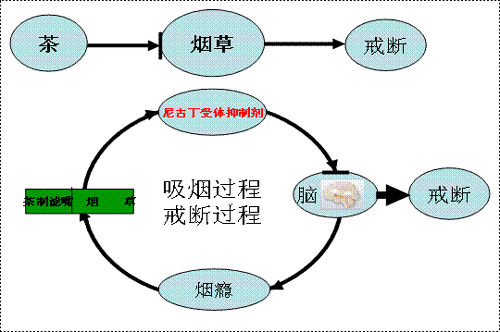A new effective strategy for treating tobacco addiction was found by researchers from Chinese Academy of Sciences
To solve one of the world’s largest public human health problems caused by tobacco addiction and epidemic, a tea filter was developed and studied for smoking cessation. After hard working for more than 20 years using variety of modern techniques, Professor Baolu ZHAO and his group from Chinese Academy of Scienceshave finished a study about “the cessation and detoxification effect of tea filters on cigarette addiction”. They identified theanine as the active ingredient in tea filter that inhibits nicotine addiction. It provides a new effective strategy for treating tobacco epidemic. This work was published in the X. edition Science of China, 2010.
Cigarette smoking has been linked to many life threatening diseases including heart disease, cancer and chronic obstructive pulmonary disease. There are about 1.25 billion smokers in the world and five million die every year because of smoking-related diseases, exceeding many other diseases combined. It is estimated that the global cost for smoking-related disease is about $200 billion each year, resulting in one of the world’s largest public human health problems. Many methods have been developed for smoking cessation by researchers and clinicians. Despite all efforts, currently available smoking cessation methods produce only modestly successful rates with frequent relapse.Due to the addictive nature of nicotine, quitting smoking remains extremely difficult. Therefore, the need for developing newsmoking cessation strategies with better efficacy and fewer side effects is urgent.
Human test for the cessation effect of a tea filter on smoking performed in the Addiction Branch, Beijing Military Region General Hospital shown that after using the tea filter for 30 days, the average daily cigarette consumption decreased about 43%, after using the tea filter for 60 days, the average daily cigarette consumption was decreased by about 56.5%. In another trial, 59 healthy male cigarette smokers were recruited and tested to smoke with tea filters for 3 months. The result showed that their average daily cigarette consumption respectively decreased by about 48%, 83% and 91% after using the tea filter for 1, 2 and 3 months and the average daily cigarettes consumed decreased to about 3/day in the last month from original about 24.5/day.In addition, most subjects described that sputum and their smoking-related symptoms were reduced compared to the control group. Physical examinations of the subjects did not reveal any apparent side-effects.
Mechanical experiments showed that theanine in the filter exerted an inhibition effect similar to the nicotine acetylcholine receptor (nAChR) inhibitor. Further studies shown that theanine could significantly inhibit the nicotine-induced increase expression of nAChR and increase of dopamine (DA) release in mouse brains.
Toxicological studies showed that the tea tea filter could significantly reduce the carcinogenic materials such as tar, free radicals, nitrosamine, [a] pyrene, benzo [a] anthracene, chrysene and total polycyclic aromatic hydrocarbons (PAHs ) and toxic CO generated in cigarette smoking. Tea filters also could significantly reduce the acute toxicity and chronic mutagenicity and lung damages for animal caused by cigarette smoke.
Different cigarette filters have been developed with the purpose of reducing such harmful chemicals as tar and nicotine in tobacco smoke. However, a smoker may smoke more cigarettes using these filters, inhale more deeply or decrease the time between puffs to compensate for the desired nicotine intake, leading to exposure to equal or greater doses of the toxic and cancer-causing substances present in cigarette smoke. Therefore, smoking using these filters is not an alternative for lowering the risk of smoking-related diseases. Smoking cessation methods such as nicotine replacement therapy and nAChR partial agonists and antagonists have been shown to help some smokers quit, but they also have high relapse rates and are perceived as being inconvenient. They are not easily psychologically accepted by the smokers, affecting the efficacy of their smoking cessation.
The novel tea filter treatment might avoid the pitfalls mentioned above and effectively promote smoking abstinence. Because it uses the smoking process to help quit smoking, it may be accepted by smokers with less psychological obstacles and side effects. When a smoker is smoking using the tea filter, the inhibitors of the nicotine receptor in the tea filter are absorbed through the respiratory system and travel to the brain where they exert cessation effects. This appears as a circulatory process moving towards smoking cessation, which continues until the smoker quits smoking (Fig.).
In China, the population of smokers is about 350 million and is increasing, special for women and younger people. Similar situations are found in India and other developing countries. The tea filter is produced by a slight and inexpensive modification of the existing filter which is suitable for developing countries.
Its implementation may make a great contribution towards to reducing the smoking-related diseases and public health burden and pollution caused by cigarette smoking.
This research was partly supported by a grant from the National Natural Science Foundation of China and a 973 grant from Department of Science and Technology of China. It is an important breakthough in recent year about the study of tobacco cessation. However, the researchers indicate that these work needs to be practice in huger human test and clinical trial and the mechanisms about the cessation effects of theanine on nicotine addiction should be further studied in order to promote the controlling of cigarette smoke and reducing smoking-related diseases all over the world.


